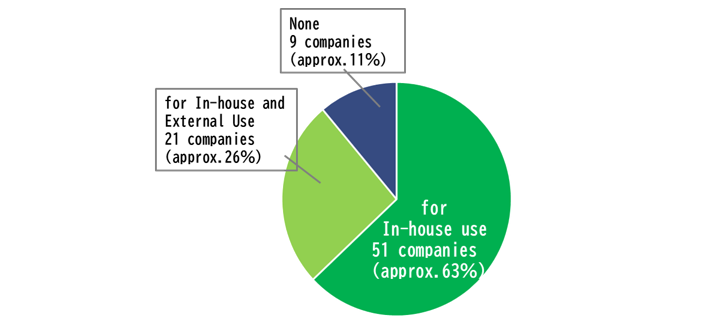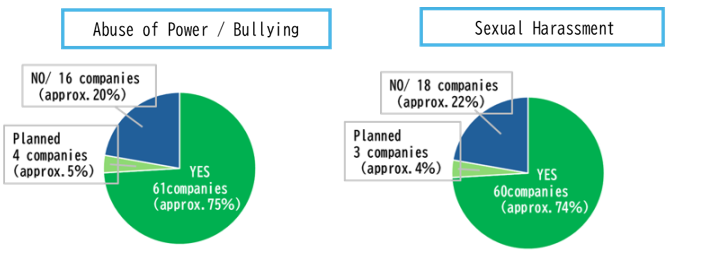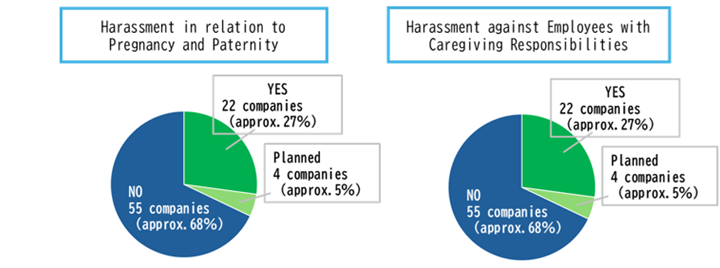Human Rights Due Diligence Initiatives
The Nisshinbo Group's mission is to "contribute to the society through our business activities," and we have been conducting our business operations with respect for human rights. In August 2023, the Nisshinbo Group established the "Nisshinbo Group Human Rights Statement" to express our commitment to respecting human rights externally in words.
Our group will be an actor in respecting, protecting, and promoting the human rights of not only our employees but also those of our customers, business partners, local communities, and all other individuals with whom we interact. We will manage our business with respect for human rights through human rights due diligence. We will strive to realize a well-being society in which people, including ourselves, who live today, and especially children who will live in the future, can each lead a happy and fulfilling life.
Initiatives for 2023
Establishment of Human Rights Statement
In August, the Nisshinbo Group established the Nisshinbo Group Human Rights Statement. This Statement is positioned as the high-level Policy of all documents and norms concerning efforts to respect human rights in the Group's business activities and is signed by the president of Nisshinbo Holdings Inc. upon approval by the Board of Directors.
To promote awareness and understanding of this Statement throughout the Group, we created and distributed a video message in which the president himself conveyed the importance of the human rights statement and expressed his thoughts on respect for human rights.
Conducting surveys
As part of our efforts to initiate human rights due diligence, we conducted the "Human Rights Due Diligence Questionnaire Basic 2023" in September to understand the current attitude and actions towards human rights, including the availability of policies related to human rights at each of our group company.
Survey Summary
Purpose of Survey
- 1. To understand the current status of the initiatives towards human rights (ex. availability of policies related to human rights, degree of employees’ awareness on human rights issues, measures taken against human rights risks, etc.) This understanding will enable us to take corrective and remedial actions as needed.
-
2. To identify issues in the “actual practices and responses” taken by each group company that may lead to human rights risks, and to consider future measures accordingly.
- • Subject: 81 group companies
- • Response period: September 22 - October 26, 2023
- • Survey method: Questionnaire (booklet with explanations)
- • Self-evaluation by employees in charge of human rights, general affairs, human resources or CSR of each company
- • Response rate: 100%
Survey Items (in the order in which they appear in the survey booklet)
- 1. Basic Stance on Respect for Human Rights
- 2. Underpaid/Unpaid Wages & Living Wage
- 3. Excessive and Unreasonable Working Hours
- 4. The Right to Social Security
- 5. Forced Labor
- 6. Freedom of Movement and Residence
- 7. Rights of Migrant Workers & Foreign Workers
- 8. The Rights of Persons with Disabilities
- 9. Child Labor
- 10. Bribery and Corruption
- 11. Abuse of Power / Bullying
- 12. Sexual Harassment
- 13. Harassment in relation to Pregnancy and Paternity
- 14. Harassment against Employees with Caregiving Responsibilities
- 15. Human Rights Issues Related to Gender
- 16. Human Rights Issues Related to Sexual Minorities
- 17. Right to Privacy
- 18. Rights of Local Peoples Including Indigenous Peoples
- 19. The Right to Access Remedies
- 20. Conflict Minerals
- 21. Understandings of the Global Framework
Summary on the institutional framework
- 1.We confirmed that approximately 70% of our group companies have adopted and are in compliance with the "Nisshinbo Group Business Conduct Guidelines" and "Nisshinbo Group Human Rights Statement" or have independently established their own human rights-related policies and guidelines.
- 2.For approximately 30% of our group companies that answered to have not yet prepared their own policies, they may not be aware of our group's policies, so we recognized the need to reannounce our groups policies to encourage them to adopt and comply with our group's "Business Conduct Guidelines" and "Human Rights Statement".
-
3.Regarding grievance mechanisms, despite the fact that 90% of our group companies had a Point of Contact for Remedies, less than 30% had a point of contact available for external stakeholders. We concluded that it was necessary to inform our stakeholders about the use of our group’s Corporate Ethics Reporting System and to reinforce our Corporate Ethics Reporting System itself.

Availability of Grievance Mechanisms among our group companies - 4.No cases of forced labor or child labor were identified in any of our group companies. However, some companies lack policies related to forced labor and child labor, so immediate measures will need to be taken to ensure that 100% of our group companies adopt such policies. In addition, many of our group companies answered to have not yet conducted surveys regarding their supply chains. Therefore, we will start approaching our suppliers by first introducing them to our guidelines on the prevention of forced labor and child labor.
-
5.Regarding harassment, which is a serious human rights risk that can lead to violation of employees' human rights, about 80% of our group companies already have guidelines and regulations regarding abuse of power or bullying and sexual harassment, and training sessions are also being conducted. However, in spite of these guidelines, the degree of effort taken to prevent harassment differ among countries and regions.

Are there any initiatives for prevent harassment at the company? -
6.As for harassment in relation to pregnancy and paternity and harassment against employees with caregiving responsibilities (care harassment), efforts made by our group companies in Japan and abroad are still insufficient. It is therefore necessary to promote a deeper understanding through awareness-raising activities.

Are there any initiatives for prevent harassment at the company?
Other results
In the following areas, some companies have not adequately developed policies/rules or taken sufficient measures:
Conflict Minerals/ Freedom of Movement and Residence/ Human Rights Issues Related to Gender/ Human Rights Issues Related to Sexual Minorities (SOGI) / The Rights of Persons with Disabilities/ Respect for Human Rights and Discrimination
We will promote the establishment of reliable policies and deepen our employees’ understanding on the themes listed above through information sessions and awareness-raising activities.
Summary on the actual situation
In spite of policies and rules in place, we identified concerns regarding the implementation of these policies and some of the initiatives for human rights. Additionally, in some cases, survey respondents from each group company were not familiar with or fully aware of certain issues.
Items of concern regarding the status of operations and initiatives
Child labor/ Forced labor (supply chain)/ Forced labor (internal)/ Conflict Minerals/ Excessive and Unreasonable Working Hours/ Underpaid or Unpaid Wages/ Human Rights Issues Related to Gender/ Rights of Migrant Workers & Foreign Workers/ The Rights of Persons with Disabilities/ Human Rights Issues Related to Sexual Minorities (SOGI)/ Abuse of Power or Bullying/ Sexual Harassment/ Harassment in relation to Pregnancy and Paternity/ Harassment against Employees with Caregiving Responsibilities/ Freedom of Movement and Residence (internal)
We will reorganize our group’s policies on human rights and encourage initiatives such as awareness-raising campaigns and trainings on human rights. Subsequently, we will consider corrective and remedial measures while conducting further investigations and interviews to promote respect for human rights in our group.
Training sessions by external lecturers
The Nisshinbo Group held a training session with an external lecturer, believing that an essential understanding of "corporate responsibility to respect human rights" ("Business and Human Rights") was necessary to promote effective human rights due diligence efforts. We invited Mr. Kazuo Tase, CEO of SDG Partners Inc., as a lecturer and he conducted several training sessions on themes related to respect for human rights for executives and members in charge from each group company. Mr. Tase spoke about the significance of human rights due diligence as an initiative that leads to the realization of a well-being society, enhancing the participants' understanding on the human rights.
The main themes of the trainings are
- ●Business and Human Rights/ Human Rights Due Diligence
- ●Sustainability
- ●Diversity & Inclusion
- ●Human Capital
Future Plans
Based on the results of our survey, the Nisshinbo Group will promote our Human Rights Due Diligence initiatives in FY2024, focusing on the following items.
-
1. Establishment of human rights-related policies (group-wide)
- ●Instruct our group companies to adopt the “Nisshinbo Group Human Rights Statement” or develop their own statement on human rights.
-
2. Maintenance of our grievance mechanism
- ●Maintenance of our grievance mechanism.
- ●Reinforce our Corporate Ethics Reporting System (NISH).
-
3. Supply Chain Management
- ●Revise our Sustainable Procurement Policy → announce it to our suppliers and conduct surveys to assess whether suppliers are compliant with our policy.
- ●Develop a scheme for responsible mineral procurement.
-
4. Development of educational system (including overseas)
- ●Conduct trainings on human rights.
-
5.Additional investigation (interviews) at each group company
- ●Consider corrective and remedial plans and appropriate actions.